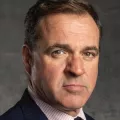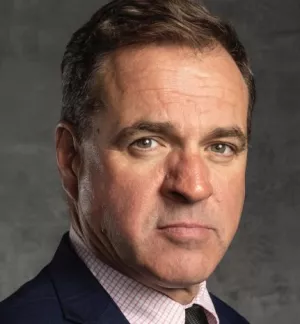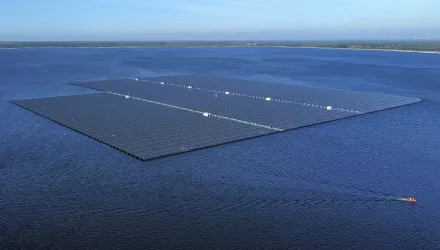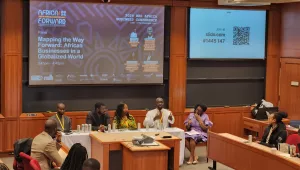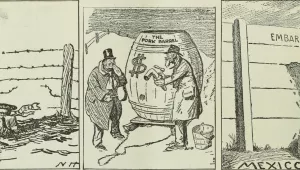Forget the fall of the iron curtain: the events of '79 matter more.
What exactly was the historical significance of Nov. 9, 1989? Having spent much of the summer of that year in Berlin, I have long bitterly regretted that I was not there to join in the party the night the wall came down. I mean, what kind of an aspirant historian misses history being made?
But two Berlin friends recently made me feel better by confessing that, despite being in the right city on the right date, they too missed the fall of the wall. One simply slept through the tumultuous events that unfolded after an East German official casually stated that the border was open. Her brother tried to rouse her, but she assumed he was joking when he shouted through her bedroom door: "The wall's coming down!" My other friend deliberately went to bed early to be fresh for a morning yoga class. It took her a while the next morning to work out why she was the only one to show up.
Embarrassing, no? A bit like being in Petrograd in late 1917 and catnapping while the Bolsheviks stormed the Winter Palace. Or perhaps not. For it is only with the benefit of hindsight that the Bolshevik coup proved to be a major historical turning point; at the time, the Russian press represented it as just another extremist stunt.
That set me thinking. Could it be that my friends and I didn't in fact miss an event of world-historical importance? Was the fall of the Berlin Wall not really History with a capital H, but just news with a lower-case n-a wonderful story for journalists but, 20 years on, actually not that big a deal? Could it be that what happened 10 years earlier, in the annus mirabilis 1979, was the real historical turning point?
Sure, it was nice for East Germans, Czechs, Hungarians, and Poles-not to mention the peoples of the Baltics, the Balkans, Ukraine, and the Caucasus-that they got rid of dreary communism and discovered the pleasures (and occasional pains) of free markets and free elections. What the British historian and eye-witness Timothy Garton Ash has called the "refolution" (reform plus revolution) that swept Central and Eastern Europe was a splendid thing, not least because the communist regimes were toppled with amazingly little bloodshed. Only in Yugoslavia, where the communists clung to power in the guise of Serbian nationalists, was there the kind of carnage that usually accompanies the end of empire-and Yugoslavia, paradoxically, was the Eastern European country that had been the first to break free of Moscow, and the first to introduce market reforms.
It may seem perverse to question the historical significance of the collapse of the Soviet empire in Mitteleuropa, and then the collapse of the Soviet Union itself. I suspect most Americans today share the Yale historian John Lewis Gaddis's view that 1989 saw the triumphant end of the Cold War, a victory achieved above all by President Ronald Reagan, though nobly assisted by Margaret Thatcher-despite her deep reservations about the unintended consequences of German reunification-and the Polish Pope John Paul II.
Yet for Princeton revisionist -Stephen Kotkin, the real story of 1989 is that of a cynical pseudo-revolution from above. Only high oil prices had kept the bankrupt Soviet empire alive during the 1970s, Kotkin argued in his 2001 book, Armageddon Averted. Now, in his iconoclastic follow-up, Uncivil Society: 1989 and the Implosion of the Communist Establishment, Kotkin dismisses the role of Eastern European dissidents, much less Western leaders, in the Soviet collapse. No, Mikhail Gorbachev and other communist reformers wrecked their own system, partly out of naiveté, partly out of a cynical desire to grab the system's few valuable assets in what became the scam of the century: the privatization of the Russian energy industry. For the wilier members of the nomenklatura, the road from KGB apparatchiki to Gazprom biznesmen was a remarkably short, though crooked one.
Not only did the same kind of people end up running Russia as had run it before 1989-step forward, Vladimir Putin-but they managed to avert a complete breakdown of the vast Russian Federation itself. The Soviet empire had gone, but to a large extent the Russian empire remained, extending all the way from Volgograd to Vladivostok: still the last European empire in Asia, with a territorial extent that would have delighted Peter the Great.
Viewed this way, 1989 was a moment of revelation, not revolution: it revealed the true nature of Russian power by stripping away the deceptive trappings of superpower status. Denuded of its Central European sphere of influence, with its economy exposed to market forces for the first time since 1914, Russia turned out to be somewhere between a BRIC (along with Brazil, India, and China, the biggest of the world's emerging markets) and "Upper Volta with missiles" (in Helmut Schmidt's famous put-down)-or maybe Nigeria with snow.
Consider the following. Russia's economy is set to be one of the world's worst performers this year, with gross domestic product forecast to decline in real terms by 7.5 percent. True, this comes after a decade of 7 percent average annual growth, but much of that merely represented recovery from the shattering post-communist depression of the mid-1990s. Russian GDP recovered to its 1989 level only in 2006. Calculated in terms of dollars, it now represents a meager 9 percent of U.S. GDP (compared with China's 23 percent). Unlike China's, Russia's currency has been all over the place in the past year, rising to above 36 rubles to the dollar in 2008, though now back to 29. Inflation is back in double digits, at about 13 percent. And Russian stocks have been the worst performers among the BRIC economies over the past three years, returning minus 12 percent a year, compared with 16 percent for China.
Add to the poor economic picture demographic projections that foresee the population of Egypt overtaking that of Russia by 2045, and it becomes clear that the once mighty Russian bear is in fact a distinctly mangy old bruin. Not really surprising, with a tuberculosis infection rate that is just half that of Bangladesh, but 27 times that of the United States.
The biggest danger for the United States, 20 years after this Russian revelation, is that we overrate Moscow, whether as a potential partner or an antagonist. At times, President Obama shows signs of believing his Russian counterpart, Dmitry Medvedev, when he offers to work in tandem with the United States on issues ranging from radical Islamic terrorism to Iran's nuclear program-hence Obama's decision to cancel the planned missile-defense installations in Poland and the Czech Republic. The reality, however, is that today's Russia is more of a troublemaker than an ally-in-the-making. Whether assassinating critics in foreign capitals, reneging on deals with Western oil companies, or aiding Iran with nuclear technology, Russia today is about the least reliable of all the major powers in our brave new multipolar world.
It is not so much that Prime Minister Putin seriously believes he can reconstitute the old Soviet Union, though some interpreted his invasion of Georgia last year in those terms. Rather, we need to understand Russia today as an extreme case of what Marxist-Leninists used to call "state-monopoly capitalism"-a political regime in which the interests of monopolistic companies (in this case Gazprom and Rosneft) become indistinguishable from the interests of the state and the elites running it.
The real question about Russian policy today is not whether Russia will invade Ukraine, but whether Gazprom's strategy of investing in new pipelines and gas fields will pay off. Should Gazprom focus on developing its dominant position in the European natural-gas market? Or should the vast gas fields of Russia east of the Urals (Yamal, Arctic, Far East) be given precedence with a view to capturing market share in China? Could Russia one day establish an Organization of Gas Exporting Countries, modeled on the Saudi-dominated oil cartel? Or is the simpler strategy simply to stoke trouble in the Middle East, covertly encouraging the Iranians' nuclear ambitions until the Israelis finally unleash airstrikes, and then reaping the rewards of a new energy price spike?
These questions themselves indicate the limited long-term significance of the Soviet collapse of two decades ago. By comparison, the events of 10 years earlier-in 1979-surely have a better claim to being truly historic. Just think what was happening in the world 30 years ago. The Soviets began their policy of self-destruction by invading Afghanistan. The British started the revival of free-market economics in the West by electing Margaret Thatcher. Deng Xiaoping set China on a new economic course by visiting the United States and seeing for himself what the free market can achieve. And, of course, the Iranians ushered in the new era of clashing civilizations by overthrowing the shah and proclaiming an Islamic Republic.
Thirty years later, each of these four events has had far more profound consequences for the United States and the world than the events of 1989. Today it is the Americans who now find themselves in Afghanistan, fighting the sons of the people they once armed. It is the free-market model of Thatcher and Reagan that seems to lie in ruins, in the wake of the biggest financial crisis since the Depression. Meanwhile, Deng's heirs are rapidly gaining on a sluggish American hyperpower, with Goldman Sachs forecasting that China's GDP could be the biggest in the world by 2027. Finally, the most terrifying legacy of 1979 remains the radical Islamism that inspires not only Iran's leaders, but also a complex and only partly visible network of terrorists and terrorist sympathizers around the world.
In short, 1989 was less of a watershed year than 1979. The reverberations of the fall of the Berlin Wall turned out to be much smaller than we had expected at the time. In essence, what happened was that we belatedly saw through the gigantic fraud of Soviet superpower. But the real trends of our time-the rise of China, the radicalization of Islam, and the rise and fall of market fundamentalism-had already been launched a decade earlier. Thirty years on, we are still being swept along by the historic waves of 1979. The Berlin Wall is only one of many relics of the Cold War to have been submerged by them.
Ferguson is Laurence A. Tisch professor of history at Harvard and William Ziegler professor at Harvard Business School. He is also a senior fellow at the Hoover Institution, Stanford, and author of The Ascent of Money (Penguin Press), out now in paperback.
Ferguson, Niall. “The Year the World Really Changed.” Newsweek, November 16, 2009

